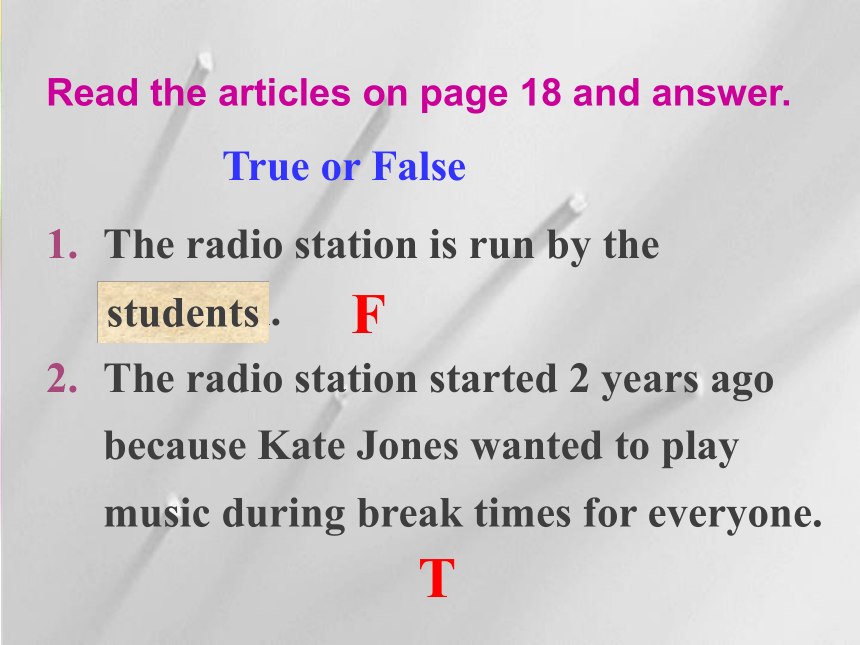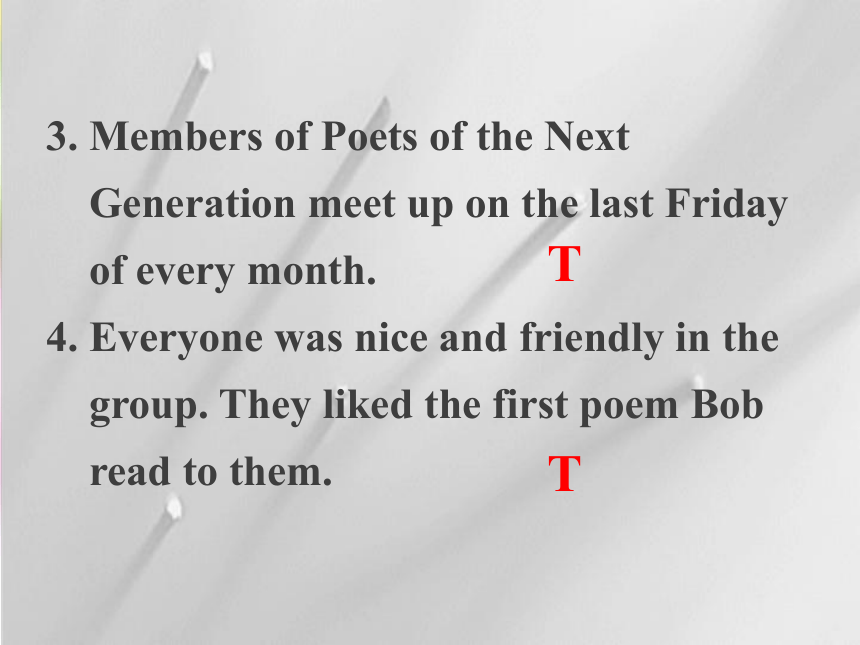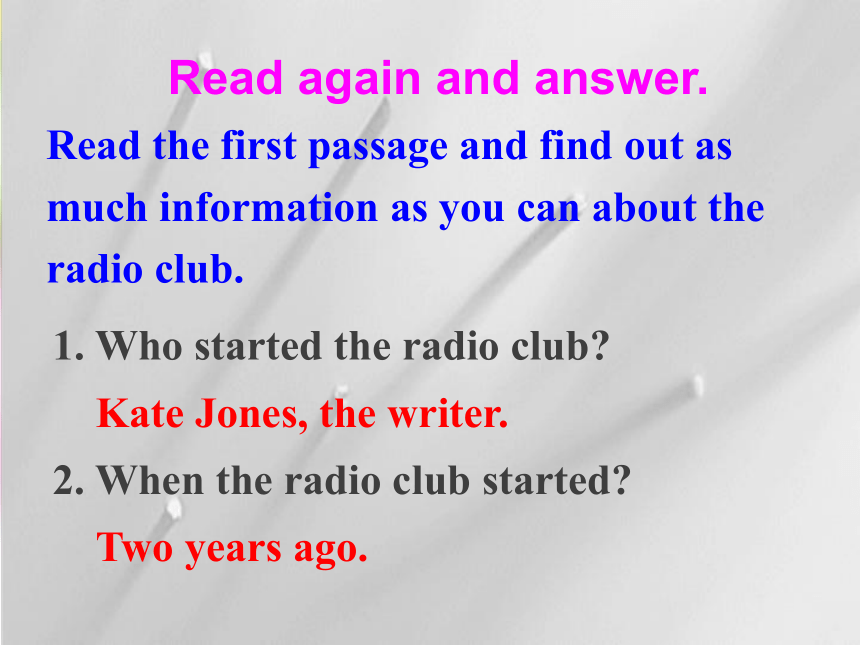高中英语译林版模块一Unit 1 School life Project(1)Starting a new school club课件(28张)
文档属性
| 名称 | 高中英语译林版模块一Unit 1 School life Project(1)Starting a new school club课件(28张) |  | |
| 格式 | zip | ||
| 文件大小 | 1.8MB | ||
| 资源类型 | 教案 | ||
| 版本资源 | 牛津译林版 | ||
| 科目 | 英语 | ||
| 更新时间 | 2018-08-18 21:21:51 | ||
图片预览









文档简介
课件28张PPT。Starting a new school clubProjectWarming up 1.What activities do you have after-school?
2. Do you like them? Why/ Why not?
3. Do you know what clubs do you have in your school? Did you join one?Different Clubs in SchoolsTrue or FalseThe radio station is run by the principal.
The radio station started 2 years ago because Kate Jones wanted to play music during break times for everyone.FTstudentsRead the articles on page 18 and answer.3. Members of Poets of the Next
Generation meet up on the last Friday
of every month.
4. Everyone was nice and friendly in the
group. They liked the first poem Bob
read to them.TT1. Who started the radio club?
Kate Jones, the writer.
2. When the radio club started?
Two years ago.Read the first passage and find out as much information as you can about the radio club. Read again and answer.3. What the radio club does?
Every morning:
Tell the students about the weather,
recent news, and special messages the
teachers want to broadcast.
During exam time:
A special programme about some Dos
for the students’ preparations.At the end of the school year:
Many students who are graduating use our club to give messages to their close friends and teachers.
When parents come:
Play the songs sung by students and give messages to inform the parents of events such as outings and school plays.1. What’s the name of the school club?
2. Who started the school club?Read the second passage and answer the following questions.Mr. Owen, the English teacher.Poets of the Next Generation.Talk about poems and poets they like, select poems and read out aloud, discuss and write poems.3. When do the members of the school
club meet?
4. What do the members of the school
club do?On the last Friday of every month.1. Which of the two clubs would you like to join? Give your reasons.
2. Suppose you are given a chance, what club would you like to run?Discussion3. How to set up a school club?
4. How to attract new members join your
club?Work in groups.Work in groups and discuss what club you
would like to start in your school. You will
have to discuss what you should do and who
will do them. Find enough information
about school clubs and posters and design
your own poster. Try to make it as
attractive as possible and present it to us.PlanningIf you want to start a school club, what club will you want to start?Every group member should suggest one, then vote to decide which one to chose.We would like to start____________.PreparingWhat is your club like? (group work)
What does your club do?
How does your club help the members achieve their goals?
When and where do the members meet?
The speaker reports the information about your club to other
Groups. Other groups should give some advice.What after-school activities do you have in your school?
Do you like them? Why / Why not?
If you could start a new after-school activity to enjoy with your schoolmates, what new activity would you choose?Discussionattract new members 吸引新成员
achieve one’s goals 实现某人的目标
provide sth. 提供某物
learn…from… 从……学习……
come up with a new idea 想出一个新主意
on one’s own= by oneself靠自己力量,独自
of one’s own 某人自己的Language focus It is time (for sb.) to do sth.
是某人做某事的时候了
present 有几种含义:
作名词,可以表示“礼物,现在”等含义
e.g. give a present to sb./ give sb. a present
at present 现在,当前
作动词,可表示 “ 介绍,展示”等
e.g. present …to… sign up (for) 签名,签字
win the competition 赢得竞争
拓展:
compete against/with sb. (for sth.)
为得到某物和某人竞争
compete in sth. (against sb.) 参加比赛/竞赛
competitive adj. 竞争的,有竞争力的
competitor n. 竞争者,竞赛者难句解析Our club is much more than just music. 我们的俱乐部不只播放音乐。
more than常置于名词、形容词、副词、动词及从句之前, “多于……;不止……”。
e.g. Her performance was more than good;
it was perfect.
她的表演非常好,可以说是完美的。注意区分:
no more than,not more than;
no more ... than ... /not more ... than ...
no more than表示“只有;仅仅”,相当于 “only”, 强调“少”。
e.g. We have taken no more than five
courses this term.
这学期我们只上了五门课。not more than意为“不超过;不多于;至多”,相当于 “at most”, 客观地说明数量。
e.g. He knows not more than you do.
他知道的不及你多。
no more ... than ... / not more ... than ...表示“前者和后者一样都不……”,其作用相当于neither ... nor ...。e.g. Jack is no more diligent than John.
杰克和约翰都不勤奋。
This story is not more interesting
than that one.
这个故事不比那个故事有趣。
2. Do you like them? Why/ Why not?
3. Do you know what clubs do you have in your school? Did you join one?Different Clubs in SchoolsTrue or FalseThe radio station is run by the principal.
The radio station started 2 years ago because Kate Jones wanted to play music during break times for everyone.FTstudentsRead the articles on page 18 and answer.3. Members of Poets of the Next
Generation meet up on the last Friday
of every month.
4. Everyone was nice and friendly in the
group. They liked the first poem Bob
read to them.TT1. Who started the radio club?
Kate Jones, the writer.
2. When the radio club started?
Two years ago.Read the first passage and find out as much information as you can about the radio club. Read again and answer.3. What the radio club does?
Every morning:
Tell the students about the weather,
recent news, and special messages the
teachers want to broadcast.
During exam time:
A special programme about some Dos
for the students’ preparations.At the end of the school year:
Many students who are graduating use our club to give messages to their close friends and teachers.
When parents come:
Play the songs sung by students and give messages to inform the parents of events such as outings and school plays.1. What’s the name of the school club?
2. Who started the school club?Read the second passage and answer the following questions.Mr. Owen, the English teacher.Poets of the Next Generation.Talk about poems and poets they like, select poems and read out aloud, discuss and write poems.3. When do the members of the school
club meet?
4. What do the members of the school
club do?On the last Friday of every month.1. Which of the two clubs would you like to join? Give your reasons.
2. Suppose you are given a chance, what club would you like to run?Discussion3. How to set up a school club?
4. How to attract new members join your
club?Work in groups.Work in groups and discuss what club you
would like to start in your school. You will
have to discuss what you should do and who
will do them. Find enough information
about school clubs and posters and design
your own poster. Try to make it as
attractive as possible and present it to us.PlanningIf you want to start a school club, what club will you want to start?Every group member should suggest one, then vote to decide which one to chose.We would like to start____________.PreparingWhat is your club like? (group work)
What does your club do?
How does your club help the members achieve their goals?
When and where do the members meet?
The speaker reports the information about your club to other
Groups. Other groups should give some advice.What after-school activities do you have in your school?
Do you like them? Why / Why not?
If you could start a new after-school activity to enjoy with your schoolmates, what new activity would you choose?Discussionattract new members 吸引新成员
achieve one’s goals 实现某人的目标
provide sth. 提供某物
learn…from… 从……学习……
come up with a new idea 想出一个新主意
on one’s own= by oneself靠自己力量,独自
of one’s own 某人自己的Language focus It is time (for sb.) to do sth.
是某人做某事的时候了
present 有几种含义:
作名词,可以表示“礼物,现在”等含义
e.g. give a present to sb./ give sb. a present
at present 现在,当前
作动词,可表示 “ 介绍,展示”等
e.g. present …to… sign up (for) 签名,签字
win the competition 赢得竞争
拓展:
compete against/with sb. (for sth.)
为得到某物和某人竞争
compete in sth. (against sb.) 参加比赛/竞赛
competitive adj. 竞争的,有竞争力的
competitor n. 竞争者,竞赛者难句解析Our club is much more than just music. 我们的俱乐部不只播放音乐。
more than常置于名词、形容词、副词、动词及从句之前, “多于……;不止……”。
e.g. Her performance was more than good;
it was perfect.
她的表演非常好,可以说是完美的。注意区分:
no more than,not more than;
no more ... than ... /not more ... than ...
no more than表示“只有;仅仅”,相当于 “only”, 强调“少”。
e.g. We have taken no more than five
courses this term.
这学期我们只上了五门课。not more than意为“不超过;不多于;至多”,相当于 “at most”, 客观地说明数量。
e.g. He knows not more than you do.
他知道的不及你多。
no more ... than ... / not more ... than ...表示“前者和后者一样都不……”,其作用相当于neither ... nor ...。e.g. Jack is no more diligent than John.
杰克和约翰都不勤奋。
This story is not more interesting
than that one.
这个故事不比那个故事有趣。
